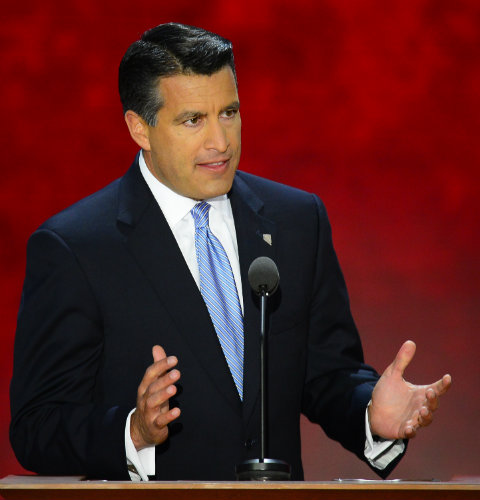Nevada Governor's Veto Won't Be The End of Medicaid-for-all Proposals
They haven't found any that work yet, but Democrats continue running political experiments with expanding government's role in health care.

On Friday, Nevada Gov. Brian Sandoval vetoed a bill that would have made Nevada the first state in the nation to have a "Medicaid-for-all" health insurance option, striking the latest blow against Democrat-led efforts to expand government-run health care plans at the state level.
The bill in Nevada—semi-seriously referred to as "Sprinklecare" after chief sponsor, state Assemblyman Mike Sprinkle (D-Sparks)—would have allowed residents who were otherwise ineligible for Medicaid (the joint federal-state program is open only to low income residents and their dependents) to purchase "Medicaid-like" plans offered by the state. Even though the bill cleared both chambers of the Nevada legislation, there were many unanswered questions, including what those plans would have covered, how much they would have cost (a not insignificant question since Nevadans making more than the Medicaid threshold would have had to purchase those plans without the assistance of federal subsidies), and how many people would have taken advantage of the new system.
It was the lack of detail—the final bill was a mere four pages long, perhaps a record for brevity in health care policy—that Sandoval said forced him to veto it.
"Moving too soon, without factual foundation or adequate understanding of the possible consequences, could introduce more uncertainty to an already fragile healthcare market, and ultimately affect patient healthcare," Sandoval, a Republican, said in his veto message. Despite the vote, he praised the bill's supporters for their "creativity" and acknowledged that some of the ideas offered by Sprinkle "may play a critical role in future healthcare policy."
Sprinkle said in a statement that he will reintroduce the bill next year. There's good reason to believe that we might not have to wait that long to see another, similar propose pop-up somewhere else. "Now that Nevada put it on the national map as a policy idea, I'd expect to see other states experimenting with similar proposals over the next few years," writes Sarah Kliff, Vox.com's senior health care editor.
For supporters of government-run health care, Medicaid-for-all has several advantages over the types of single-payer systems that have been proposed in California and New York (and previously passed in Vermont). Unlike those plans, which would sweep aside all private insurance in favor of government-run insurance, Nevada's proposal would have offered the Nevada Care Plan alongside private offerings on the state's Obamacare exchange. The idea was to give an additional option to Nevadans who might earn too much to qualify for Medicaid but who otherwise might not be able to afford private insurance. With the Congressional Budget Office estimating that some 26 million Americans might lose their health insurance if the Republicans' healthcare bill becomes law, Sprinkle positioned his bill as a state-level alternative for those who could lose coverage, if and when Congress acts.
The lack of specificity in Sprinkle's bill meant there were widespread fears of unintended consequences. Health care providers worried about reimbursement rates—a longstanding fight between providers and Medicaid—and warned that Nevadans who already have private health insurance could jump to the new public option if it was more generous, the Los Angeles Times reported. In his veto message, Sandoval pointed out, correctly, that merely providing more coverage for people is not the same as giving them more health care. He also worried about disruptions to the state's current insurance market and the potential to drive doctors out of the state, again a consequence of Medicaid's lower than average reimbursement rate.
"The net result could mean greater wait times and less provider availability for all Nevadans, whether they are on Medicaid, Medicare or commercial insurance" Sandoval wrote.

The bill also lacked a clear analysis of how many people would sign up for the new state-run insurance option and how much the state would have to pay for offering it. Those projections can be wrong, but signing the bill without knowing those details would have been foolish.
Michael Schaus, communications director for the free market Nevada Policy Research Institute, said the veto is a welcome sign and called the Medicaid-for-all plan "an inferior government program" that wasn't a real solution for health care.
"Until the political discussion about healthcare goes beyond a promise to simply make someone else pay for everyone else's healthcare, real progress simply cannot be made," Schaus told Reason. "After all, the issue facing the the industry in Nevada—just as in the rest of the nation—isn't that government subsidizes too little or is too hands-off in its approach. It's actually quite the opposite."
As I've written before, progressives face many hurdles before being able to implement a single-payer system—or even a less expensive and less disruptive Medicaid-for-all system—anywhere beyond the bluest of states. Implementing a system that works and can be funded over the long-term is yet an even larger challenge.
Still, there is something worth noting about the effort. Republicans spent most of the past decade out of power in Washington, D.C., but with growing influence over state policy thanks to a tsunami of local and state level electoral victories. They used that influence to block some aspects of Obamacare from taking root—most notably the expansion of Medicaid—but generally failed to do much in the way of crafting their own health policy ideas. If the states are meant to be laboratories of democracy, then Republicans certainly missed a chance to experiment with what works and what does not, both in terms of policy and politics.
That may be one reason why the GOP, now that it's back in control of the federal government, is failing so spectacularly to create an Obamacare replacement. To be sure, there are dozens of other factors at play in the federal health care debate, but on a very basic level Republicans are struggling to find the overlap between what their voters want and what they are able to deliver. Those are questions that might be easier to answer with a few years' worth of trial and error in state capitols.
On the left, the progressive wing of the Democratic Party is being quite clear about its plans to put health care near the forefront of its future campaign to retake the reins in Congress. What we are seeing now in places like California, Nevada, and New York is partially a response to Republican efforts at the federal level to roll back aspects of Obamacare, but it's also an attempt to work out some of the details in what that future national health care policy platform will look like.
That's why even conservative pundits like Charles Krauthammer believe we're on the "road to single-payer" in the wake of a botched Obamacare repeal/replace effort.
I'm skeptical that the future of American healthcare is a foregone conclusion, mostly because I've yet to see evidence that a single-payer health care plan can work without massive tax increases that even ardent blue-staters would reject. Still, Nevada's Medicaid-for-all plan is best understood, for now, as another attempt to test the political fences and continue building a narrative around the progressive vision of healthcare policy. Those who believe in free market health care ideas need to pay attention.
This bill failed. Next time, somewhere else, with more answers, it might not.


Show Comments (15)